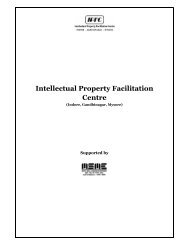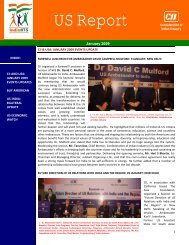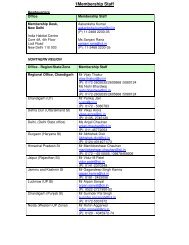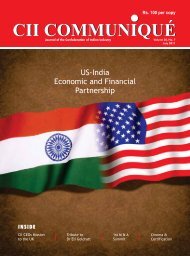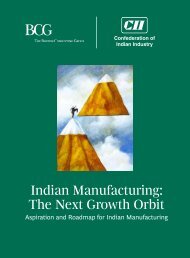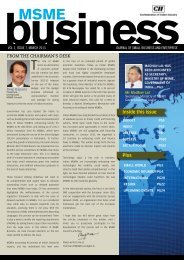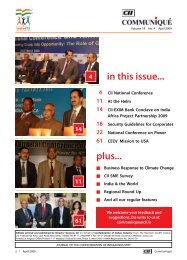CII Communique - February, 2010
CII Communique - February, 2010
CII Communique - February, 2010
Create successful ePaper yourself
Turn your PDF publications into a flip-book with our unique Google optimized e-Paper software.
msmes<br />
single-stop mechanism for the provision of municipal<br />
services.<br />
10. New clusters for MSEs should be created to meet<br />
the requirements of planned development and growth,<br />
consistent with the policy of progressively organizing<br />
the MSEs. Development of new infrastructure for the<br />
MSME sector should be substantially augmented with<br />
the government stepping in with viability gap funding<br />
to encourage private sector participation.<br />
11. Government should strengthen the NSICs equity<br />
base to give a demand side impetus to MSME enterprises<br />
in addition to the preferential procurement and volume<br />
stipulations enunciated earlier. This shall help remove<br />
bottlenecks in procurement of raw materials and also<br />
step-up marketing support and provide better backward<br />
and forward linkages to the sector.<br />
12. Government should consider earmarking funds<br />
to the tune of Rs. 1500 crore, within the enhanced<br />
investment package proposed above, to support clean<br />
technology initiatives of different Ministries involved with<br />
MSME growth, particularly in the context of the National<br />
Action Plan for Climate Change (NAPCC). This amount<br />
should be utilized by up-scaling existing schemes or<br />
by evolving new schemes to assist existing MSMEs in<br />
acquisition, adaptation and innovation of modern clean<br />
technologies as well as the creation of a Technology<br />
Bank/product specific technology centres to enable them<br />
to move up the value chain.<br />
13. The concept of business incubators in educational<br />
institutions of repute should be encouraged by setting<br />
aside Rs.1000 crore within the overall package.<br />
Legal and Regulatory Structures<br />
The legal and regulatory structures and provisions<br />
affecting the MSME sector that should be taken up in<br />
the medium term (1-3 years) are as follows:<br />
1. Government should expedite the establishment of a<br />
‘SME Exchange’ which is already under consideration.<br />
2. Workable legal options should be developed for<br />
the securitization of ‘trade credit receivables’ and for<br />
the promotion of ‘factoring services’.<br />
3. Wide publicity should be given to new formats<br />
like Limited Liability Partnerships and Single Person<br />
Companies, which provide MSMEs with an interim<br />
solution in the move from the informal to the formal<br />
economy.<br />
4. The insolvency legislation should be<br />
comprehensively reviewed in recognition of the reality<br />
of the global market where enterprises continuously<br />
get created and destroyed.<br />
5. Labour laws should be simplified, especially those<br />
applicable to MSMEs, since the transaction costs for<br />
complying with these laws are disproportionately high<br />
for these units.<br />
While some steps have been taken by the Labour<br />
Ministry in this regard, we recommend that a single and<br />
comprehensive legislation for MSEs with 40 workers may<br />
be worked out. At the same time, keeping in view the<br />
large size of the unorganized sector within MSMEs, the<br />
labour related issues for this sector should be focused<br />
more on welfare rather than legislation by, inter alia,<br />
use of the recently promulgated Unorganised Workers<br />
Social Security Act, 2008.<br />
North-Eastern States and J&K<br />
While the Government has introduced special packages<br />
and policies for the NER and J&K, there have been<br />
intra-state and intra-regional asymmetries in utilization<br />
which need to be looked into by the respective state<br />
governments. Additionally,<br />
1. Some modifications in the capital subsidy scheme<br />
should be made, so as to allow MSMEs to avail of<br />
subsidy for their expansion.<br />
2. The budgetary provisions which have been reportedly<br />
inadequate to meet subsidy claims under these schemes<br />
may be supplemented so as to clear all pending claims<br />
for MSEs up to 31.3.09.<br />
3. The J&K Government has been demanding that the<br />
incentives available for MSMEs in the State be brought<br />
on par with the modified NEIIPP of NER. This demand<br />
appears to have some merit. The J&K package may be<br />
enhanced and brought at par with the modified NEIIPP<br />
of NER for MSMEs.<br />
4. A fund of Rs.100 crore within the corpus may be<br />
earmarked for implementing a special rehabilitation<br />
package on easier terms for identified sick units in J&K.<br />
Conclusion<br />
None of these measures will work unless their<br />
implementation status is monitored regularly at the<br />
highest level. The issues are simply too diverse to<br />
be handled by a single line Ministry. The Task Force<br />
accordingly recommends the establishment of the<br />
Prime Minister’s Council on Micro and Small Enterprises<br />
in the Prime Minister’s Office which may oversee<br />
implementation of these recommendations on a half<br />
yearly basis. The Ministry of MSME shall be the servicing<br />
arm for the Council.<br />
50 | <strong>February</strong> <strong>2010</strong> Communiqué




